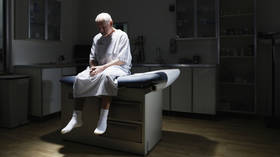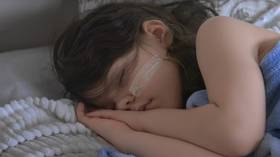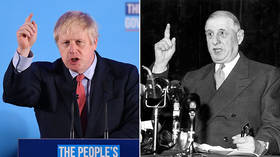‘OK, Boomer’ mentality: Academics want to label old age a disease, in case you had any respect left for the elderly

Prominent academics are pushing for the World Health Organization (WHO) to include old age on its list of diseases. They say it will improve old people’s lives – but in reality, it will give everyone the excuse to write them off.
In their wisdom, 30 experts – from prestigious universities like Harvard, MIT, Stanford, Cambridge Imperial and UCL – have decided that ageing is no longer a normal feature of life. They want the World Health Organization to classify ageing as a disease. This diseasing of old age represents another blow to the moral status of the elderly.
The experts claim that the transformation of ageing from being a natural part of the cycle of life into a protracted phase of illness will ensure that the medical treatment that the elderly receive will improve. No doubt these medics actually believe that they have the best interest of the elderly at heart. But by rebranding the process of ageing as a form of illness these experts unwittingly contribute to the weakening of the moral status of the old and contribute to the ongoing erosion of the authority of adulthood.
Being old is already considered to be an unattractive and undesirable stage of life. The call to diagnose ageing as a form of illness will merely enhance its negative image.
Wise elders cast down
Once upon a time growing old possessed the positive connotation of gaining maturity and wisdom. Indeed, old age was associated with moral authority. In most societies people turned to the elderly for advice and guidance. Ageing was rightly perceived as a natural process that need not lead to physical demise or social death. On the contrary, ageing provided a unique avenue for gaining respect from the younger members of the community.
In contrast, contemporary Western society rarely associates old age with any positive attributes. At best, the elderly are dismissed as out of date and irrelevant people, whose archaic views ought to be ignored. At worst, the elderly are demonised and scapegoated for robbing the young of their future and condemned for being responsible for the environmental crisis facing the world.
In some instances the elderly are not simply condemned as the cause of young people’s problems, but as unworthy of the kind of esteem given to other groups in society. In a world where acts of prejudice directed at groups are universally condemned it’s still OK to demonise the elderly. In recent times, uninhibited derision is being heaped on older generations by the British media for supporting Brexit. A journalist writing in GQ was not joking when he proposed a "total ban on anyone of retirement age voting in the Brexit referendum." He claimed that senior citizens were not able to exercise their democratic rights responsibly and concluded that "we take pensioners’ driving licences away… Why not their right to vote?"
Also on rt.com Politician who joked about ‘putting down’ poor people should NOT have apologized – here’s whyDehumanising the old
The scapegoating of the elderly amounts to a form of gerontophobia, which dehumanises the old. Unfortunately, this unflattering representation of the elderly has become normalised to the point that many old people feel culturally isolated and constantly devalued. In my own research of the process of ageing I was struck by the profound sense of alienation and estrangement that many of my elderly respondents communicated to me. In particular they expressed a deep sense of cultural distance from the young.
The authority of old people is even devalued in the one area where their contribution has always been respected throughout the world. Even in the domain of child-rearing, the experience of elderly people is regarded with scorn.
Consequently, the experience, customs and insights of grandparents are increasingly derided and ignored. Older people are castigated as far too old-fashioned to offer modern advice to parents struggling to bring up their children. Time and again, experts lecture mothers and fathers not to bring up their offspring in the same way as their parents or grandparents did. From the perspective of the Western parenting professional, grandparents offer a negative model of child-rearing – a moral contrast to the supposedly up to date parenting promoted by 21st century technocrats.
Some experts even go so far as to insist that the behaviour of grandparents constitutes a risk to grandchildren. In 2013, a report published in the journal Evolutionary Psychology concluded that grandparents can be a threat to their grandchildren’s health. The report asserted that its survey found that one in every three children aged three who were cared for by their grandparents were obese.
This report, like the statement issued by the 30 university experts, totally overlooks the human qualities and needs of the elderly. Diagnosing ageing as a disease will not improve the health of the elderly, it will contribute to the diminishing of their well-being. The elderly will become even more isolated from their communities if they are perceived by definition as ill. And it is their isolation from community life that constitutes the greatest risk to their health and well-being.
The negative attributes attached to ageing have already exacted a great cost to society. Do we want to make the situation even worse by diseasing the old?
Think your friends would be interested? Share this story!
The statements, views and opinions expressed in this column are solely those of the author and do not necessarily represent those of RT.
















